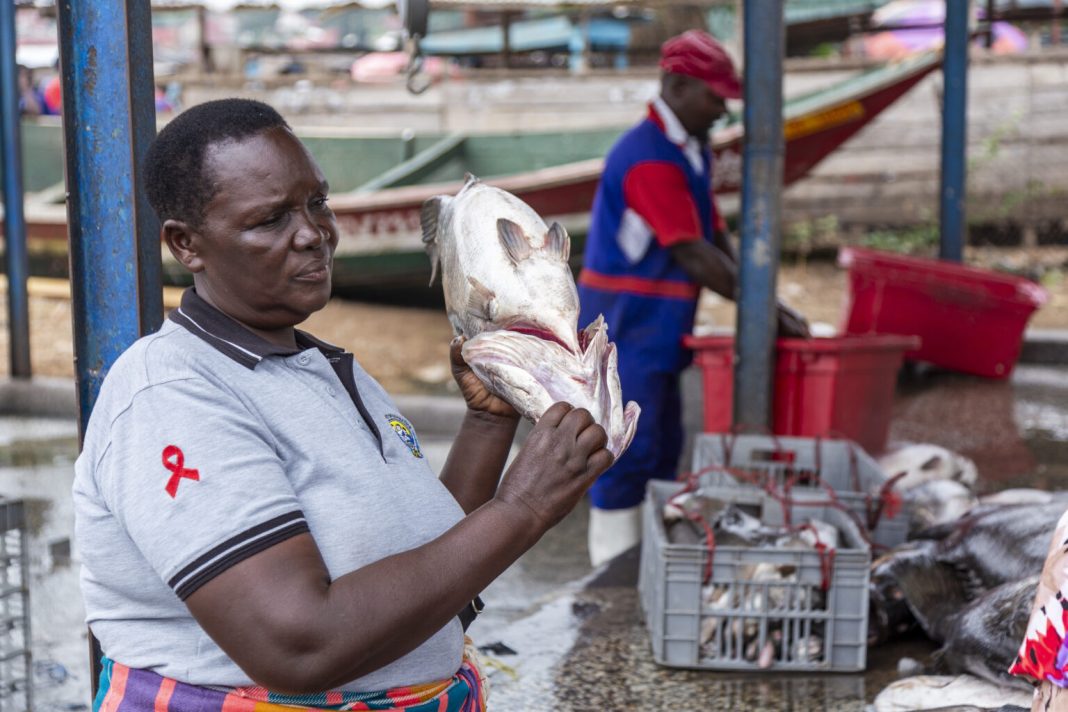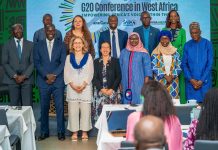By Curity Ogada and Ambrose George Emodingo
“My grandfather was a fisherman, my father was a fisherman, I am a fisherman, and there is a high chance my son will be a fisherman, it is all I know, it is all we know how to do, it is all we have ever known,” says Everest Otieno Panyako, the Beach Management Unit Chairman at Koguna Beach in Mbita, Homabay County in Kenya.
In Kenya, Homabay county’s demand for Silver Cyprinid, commonly referred to as “Omena” continues to skyrocket. Koguna Beach with its clear waters, calm and serene, has boats perched on its shores each with its motor engine attached to it, the shore is alive with activities, women doing their laundry, children running around, but you cannot miss the women busy drying their fish, their bounty for the day, from the hardworking fishermen. These women may seem as a minor touch to the fishing economy, but do not be fooled, they are the backbone of the fishing economy in Homabay County, Kenya.
They determine the cost of fish, the distribution channel, storage of fish and even consumption. Once a fisherman is at shore with their catch, their role ceases there and they are now at the mercy of these great fishmongers that await on the shores. They wait, breaths held, as these women decide on how much their catch will be valued. This sometimes depends on the overall catch of the fishermen, demand and supply, quality and quantity of their catch.
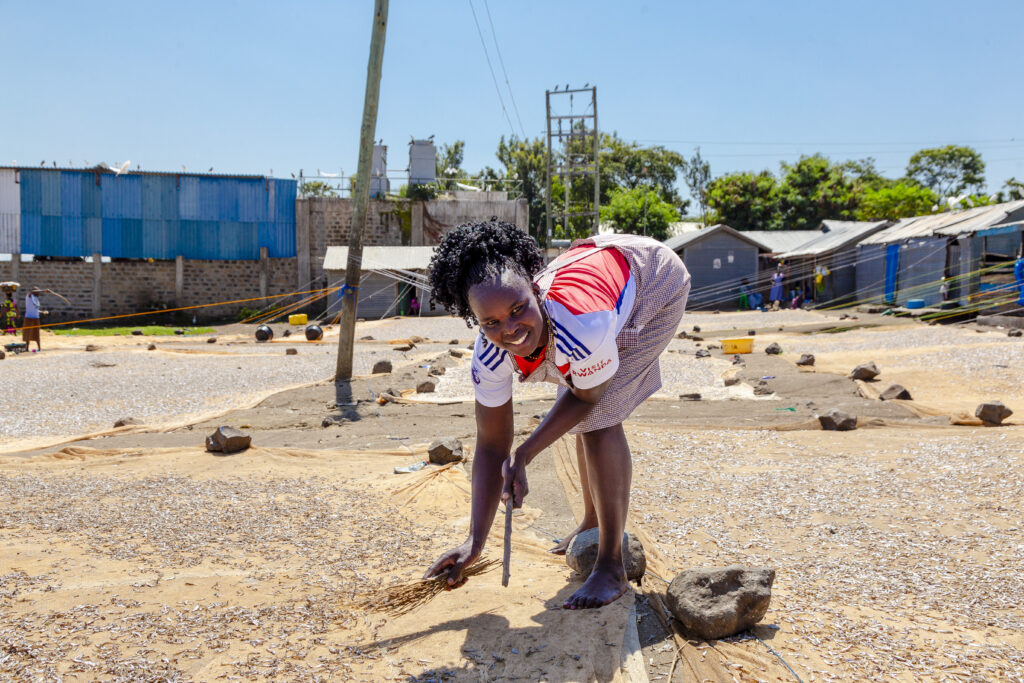
George Maende, a fisherman at Koguna Beach has been fishing for 25 years, he learnt it from his father, after school, there was not much he could do so automatically, he turned to fishing from 22 years of age.
“Fishing is quite costly, I have tried other sources of income, but I always come back to fishing; it is quite addictive.” Even though George recognises the lake needs some offseason to recover, he says they have bills and families to take care of. He also reflects on a time back then, when the lake was not as populated as it is now, the modern fishing gears are not helping, neither are the engine boats.
“With engine boats, fishermen can access fish breeding grounds, and this affects continuity. The engine boats have made things worse, spillage of fuel sometimes rid fish of oxygen, and more often than not we find ourselves fishing dead fish.”
According to the Kenya Institute for Public Policy Research and Analysis (KIPPRA), the lake-wide contribution of Omena to the total fish catch in the three Lake Victoria riparian countries increased uniformly from a negligible proportion in 1968 to 30% of total landings by 2004. Omena took the first position in economic importance in contribution to income, employment, food security in Kenya and second position in Uganda and Tanzania (Ibengwe and Kristófersson, 2012; Kabahenda et al., 2009; Ogutu-Ohwayo et al., 2002).
On average, Omena contributes more than 40% of the total fish landings in Kenya. Landings for the fishery surpassed that of Lates Niloticus (Nile perch) since the year 2000 (Government of Kenya, 2011). In 2011, Omena led in landings, contributing over 54% by weight compared to Lates Niloticus (35%) and O. Niloticus – Tilapia (6%). Suba sub-county is leading in production (70%) followed by Bondo sub-county and Busia County, this is according to a research conducted by (KIPPRA)
George shares that people no longer follow rules, there should be off seasons, where the lake is left alone, there should be regulations on the number of boats one person can license, but as it stands currently, one person can own up to 150 boats in such a small beach.
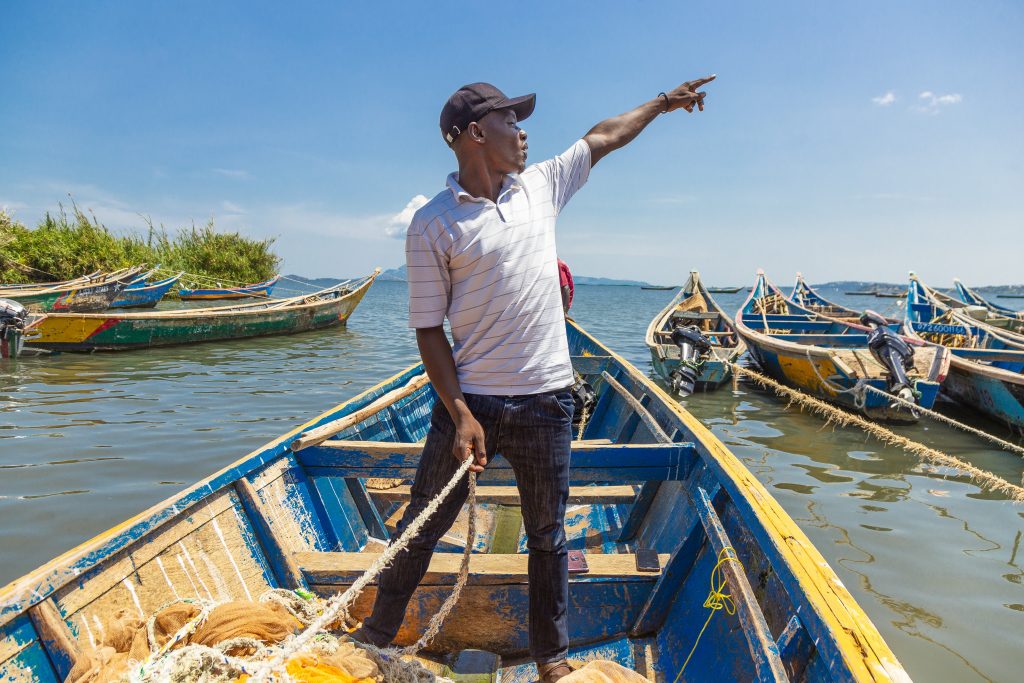
Maurice Onyango, also a fisherman at Koguna Beach, currently also serving as the Beach Management Unit Secretary General, began fishing 10 years ago after job hunting went south. He graduated with a degree in Environmental Health Sciences from Kabarnet. “I grew up watching my father fish, I am a fisherman, and my son could turn up a fisherman; however, I would not recommend it, fishing is like gambling, a very risky job and not to mention the declining fish stocks.”
Maurice reflects on a time back then when the lake felt more peaceful, more giving, they used traditional fishing methods, traditional gears, and they would go for 3-4 months periods a year when they would close the lake, to allow for breeding and growth, and so back then there was a lot of fish and people at least followed set rules and regulations unlike now.
“We rely on the fishmongers a lot, it’s tedious job to fish overnight and when you are shore all you want is money for your catch, we rely on these women to buy our catch, dry them, sell them and keep the cycle going, without them the fishing culture would not be as vibrant,” concludes Maurice.
Daughters of the Nile
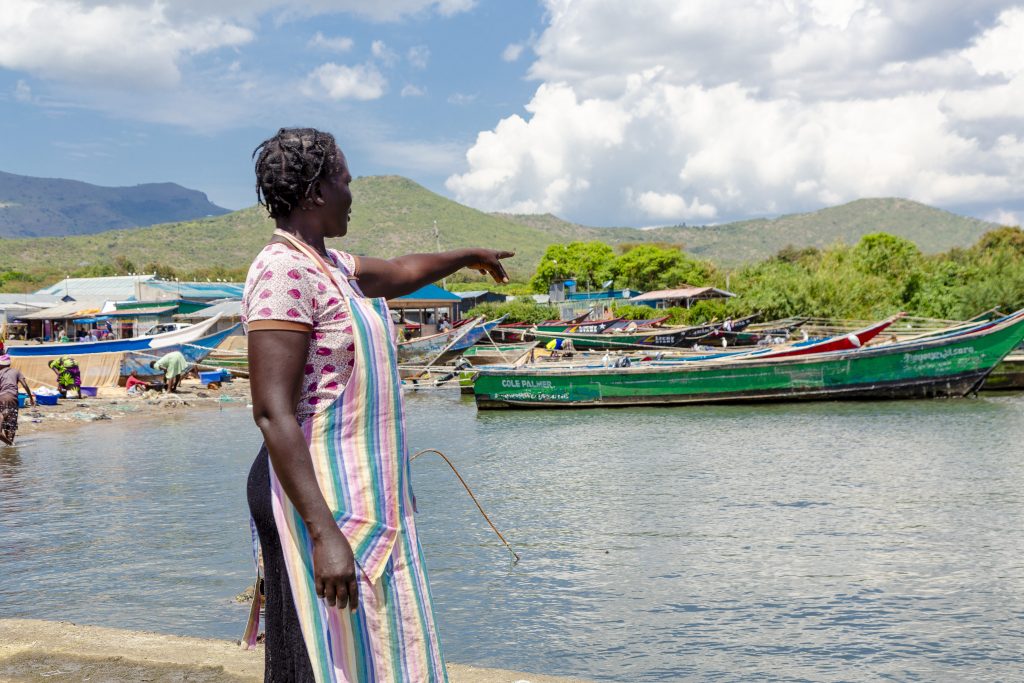
The women who operate the Kenyan beaches of Lake Victoria are built differently; they are aware of their power, they command the beaches with authority and it goes without saying they command respect from the fishermen, after all, without them, the continuity of the fishing culture is halted. These women have supported the culture for generations, weaving through the different evolving times and building their resilience with each passing period. But, these women are not just fishmongers, they are talented in other ways, they are negotiators, business women, innovators, creators and skilled in other ways like pottery, sisal weaving, knitting, and so much more.
In Koguna Beach, we are met by a wise, calm Patricia, 48 years old, a mother to 4 children and has been selling fish, especially “omena” for five years now. She talks of the current demand for fish that continues to rise with growing populations, and the supply is minimal. As much as this means more business for them, it is worrying that each time the fishermen dock at the shores, there is less and smaller sized fishes, she remembers a time the lake had bountiful fish “we relied on the moon to fish, they used optimus lamps which were kinder to the fish and somehow regulated the fishing grounds, and there were off seasons, it was truly a kinder, warmer and much more peaceful time of relating with the lake, and it gave us much more in return.”
Patricia deeply stressed that she would not encourage younger people to indulge in the fishing culture, and would encourage trying other source of livelihood like pottery, or weaving sisal, these are things needed in the fishing community but no one makes them around and so they have to buy them from other communities, as much Patricia has some of these skills, her commitment to fishmongering is so tiring leaving no room for much outside of it.
“I was born here, my grandmother was a fishmonger, my mother is a fishmonger, I dropped out of school when my mother who is a single mother could not afford my school fees.” says 32 year old, currently a mother of three and has been selling fish since she was 22 years old, she has 10 years of experience, she talks of the cost of fish back then and now. “10 years ago, a basin full of omena would go for ksh.1000 (10 dollars), but the price has currently doubled, this is dependent on the economic hard times, and the price of fuel to drive the motor engines.
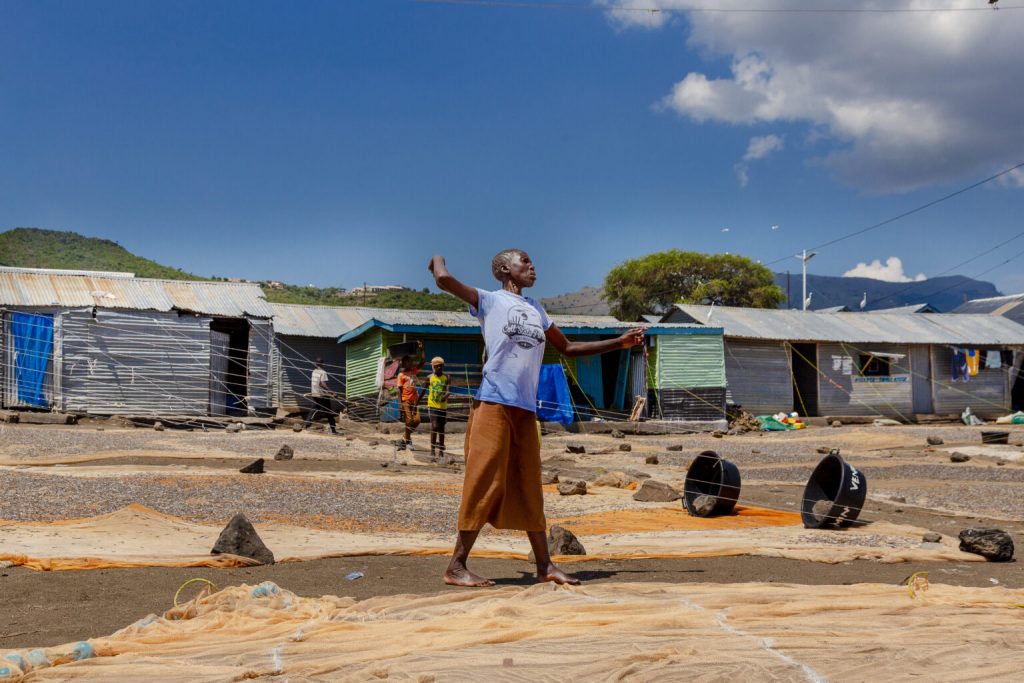
The pearl of Africa, is doing something different, something difficult, life-altering, but this could be what the lake needs, and you can see from the nature of the bounty fishermen can catch from this side of the lake. In the depths of Mukono, a Municipality in the Central region of Uganda, is a remote beach, with a vibrant community in a town called Katosi. Katosi has a bustling trading centre, it is not until you spot the vast beach that you realise this is a fisher’s community.
The beach is lined with a few boats, some idling by, no fishing activity, while some boats are active and even offloading some large Nile perch for distribution. You can tell the beach is quieter, there are fish drying racks lying empty just close by.
In case you are wondering what happened to the fishing culture here, fishing of Silver Cyprinid, locally known as “mukene” was banned in 2024, and it’s been almost a year now that this beach has gotten used to the quiet life.
The Ugandan government banned the ‘hurry up’ fishing method, primarily used for catching silverfish (mukene), to protect dwindling stocks of Nile Perch and other juvenile fish. This ban forced some fishermen to move into neighbouring countries to hunt for “mukene”. As much as this ban is good news to Nile Perch fishermen because the business is booming, it has strained the mukene business, including the women fishmongers of this particular region.
These women cannot be stopped, deterred or slowed down.
Women of Hope
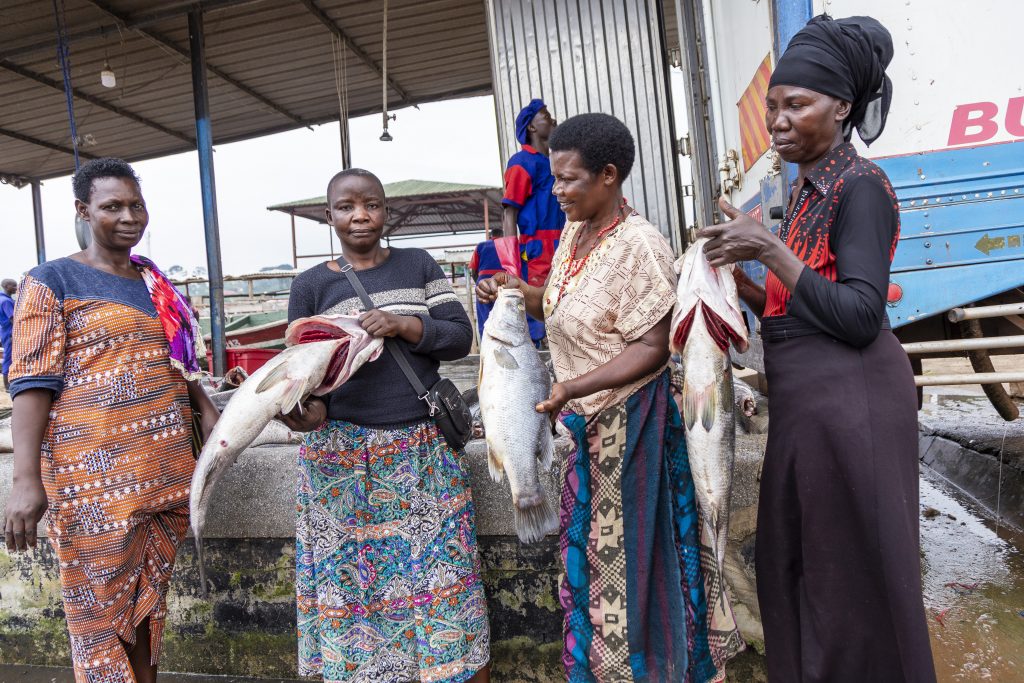
It is in this small community that we meet powerful women, innovators, who are determined not only to change our views of traditional fishmongering but women who are willing to adapt with the changing tides.
Women of Hope Group, Katosi is made up of women from the fishing community who came up together to bring newfound hope to these women. Through their leader Martha Nangobi, the group began in 2004, previously using rudimentary methods to dry fish. The women began saving up and in 2020, using their savings of 25 Million UGX, the Government of Uganda added 25 Million UGX, and they secured a fish drying machine, which became a game changer for these women.
Speaking to Nalubega Miriam, who talks of the abundant benefits they have ripped from the machine, from being less hazardous, time saving and boosted their livelihood by a mile, she also speaks of how they transformed from charcoal to locally made briquettes to power the machine which led even to much more savings, even though the ban of mukene has really slowed them down by having to get from other countries, she admits the machine changed the game for them.
Nakityo Prossy came to Katosi in 1990, the eldest in a family of 8 members, and she says back then they used old methods of drying fish, and sometimes this would burn the fish, plus the smoke was not too kind to their health. “This group is a registered company and is recognised by the government of Uganda. We were in full-blown poverty before we bought this machine. We engaged in fishing ourselves using DMC (Dangerous Mechanical Condition) boats, which were later banned and captured.”
Prossy says the ban, plus the reduction in fish stocks, has affected their business financially, due to a lack of continuous production, which ends up being expensive in the long run.
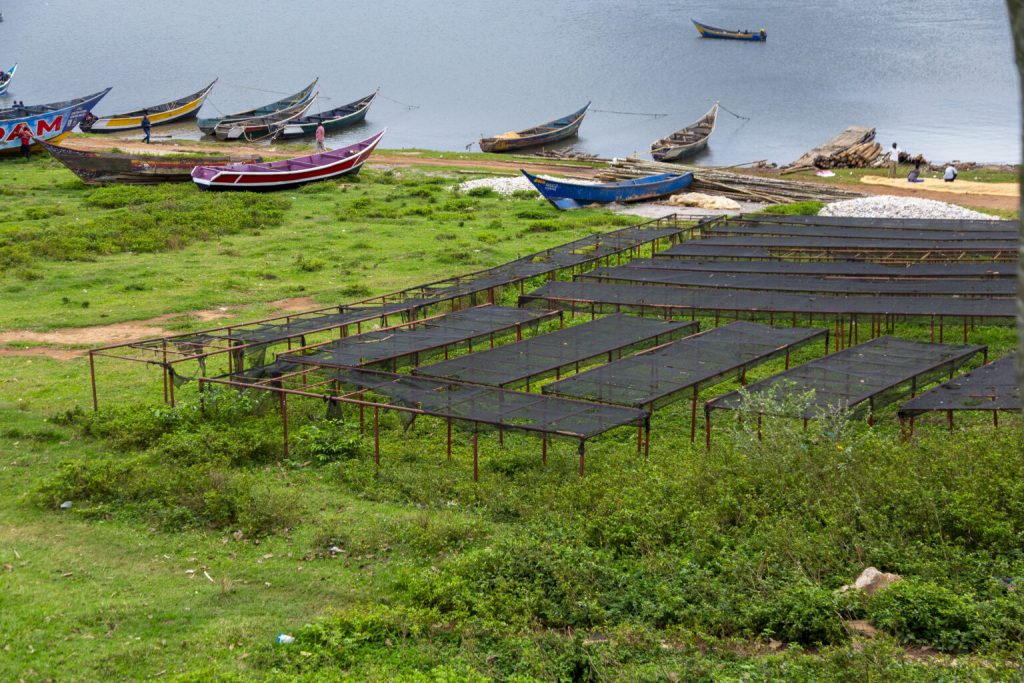
Margaret Nyakeisti 74 years old and Nayiga Jennifer 62 years old born and bred in Katosi, affirm the beauty of Women of Hope group, they have been through tough times, but the friendship forged from the group has cushioned them during tough times, with the depleting fish stocks, and the ban of “mukene” they have acquired skills as a group like soap making, pig rearing, making briquettes, cage fishing and more, they train even younger students during school holidays some of these skills to empower and expose them to wider world outside of fishing.
These women of hope continue to dream big; they hope one day they can get an export license to enable them to export their fish.
The future
Innovation and creativity is at the heart of bodies like Uganda National Women’s Fish Organization (UNWFO) whose inspiration model is to create an enabling environment for women and youth involved in fish production, processing, marketing and trade.
Lovin Kobusingye, the current president of the organisation, says they also work with young girls and boys, work with and mentor students interested in taking fisheries as a major, lobbying for them. “ We ensure there is gender inclusiveness in the fishing sector, not only that, we also work with refugees, build them up economically on different landing sites across the country, ensure they have shelter, livelihood and a good network.”
UNWFO works represent the interests of community groups like the Women of Hope in Katosi. Working with all age groups from primary level to supporting older women from the comfort of their homes, hence creating a neat and community-like support system.
“Women have the information, but sometimes they shy away from sharing it, because of stereotypes and stigma. At UNWFO, we build these women’s trust, they own their ideas, we are receptive to their innovative thoughts, we listen, we do not judge,” says 26-year-old Josephine Kawala, the organisation’s communications and IT officer.
Josephine says while educating the women on value addition to the fishing sector, they use local languages and English to educate the women, especially when it comes to disseminating research, they also employ the use of manuals with pictorial presentations during training. “We make these training sessions as practical as possible, and it is a community-based learning where we work with community group leaders and track progress through digital channels like WhatsApp,” she adds.
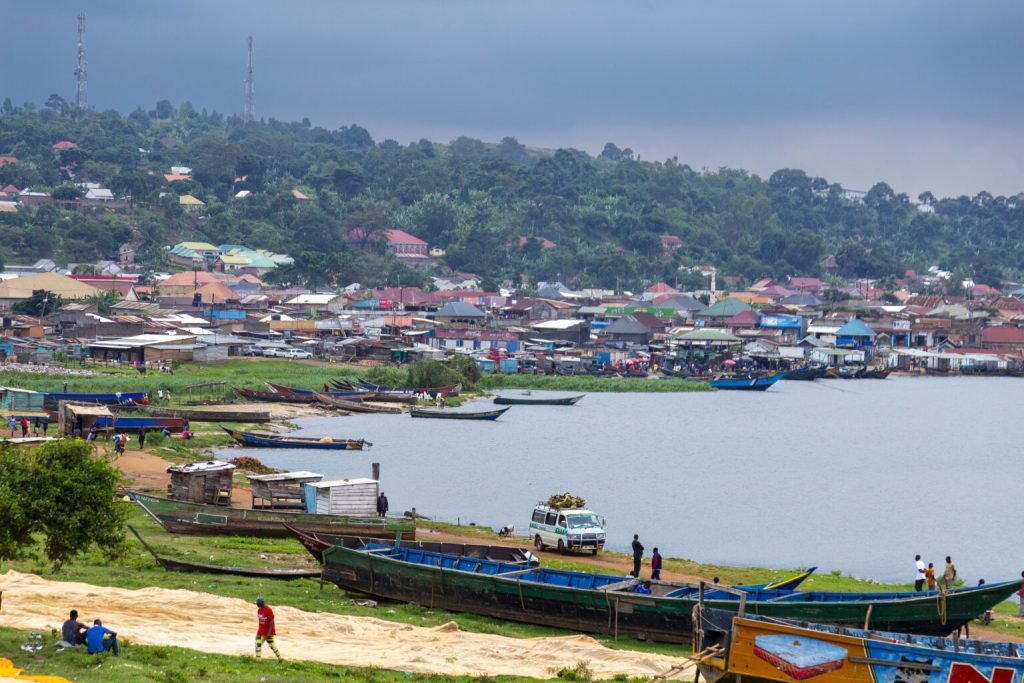
UNFWI also works intimately with the Ministry of Agriculture, Animal Industry and Fisheries – Ministry of Uganda, even in training and mentoring these women. With the recent ban of “mukene”, the Uganda National Women’s Fish Organization (UNWFO) have partnered with the German Agency for International Cooperation (GIZ) under the Comprehensive Unit-based Safety Program (CUSP project) to conduct research on the methods of fishing. This research will help to determine if the methods of fishing are a problem and what can be done as a result.
Josephine says the goal is to inform policy and find a way forward, have a dialogue with the parliament and the ministry, depending on the recommendations suggested from an informed perspective.
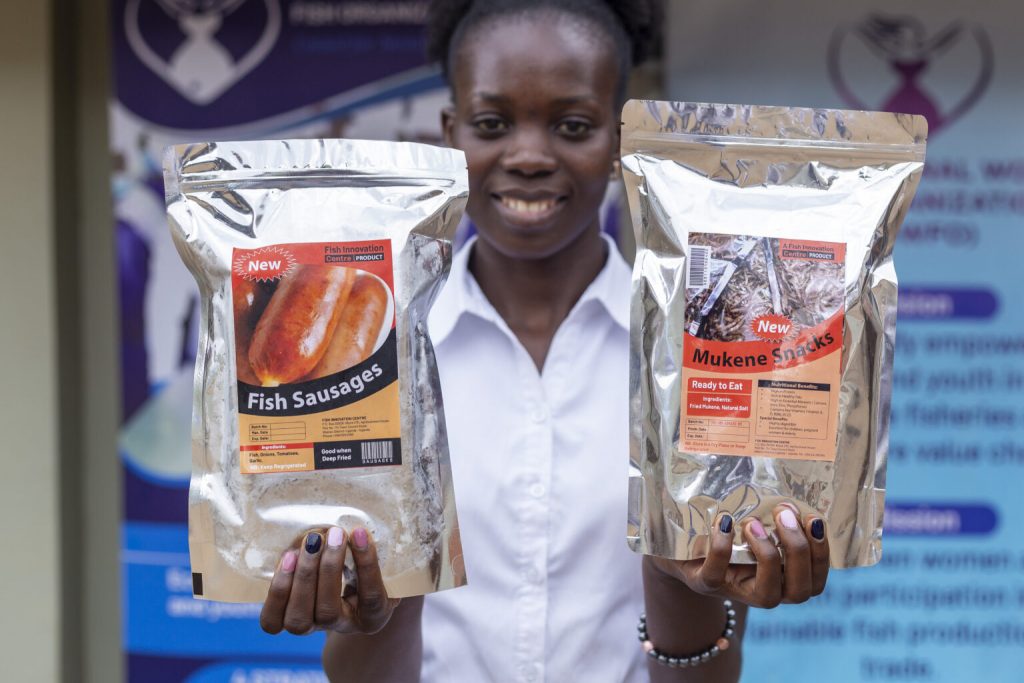
Transboundary issues, local solutions
Lake Victoria is stressed, and overfishing is at an all-time high. And being that this is a shared resource among three countries, it calls for transboundary resolutions. The fishing sector is riddled with corruption, unsafe fishing methods, rogue licensing and a lack of discipline on the part of the different stakeholders around the sector. However, we do have local solutions, like the Women of Hope, who are building resilience in the face of adversity. If we could support community-based groups, they could cascade this change locally, and the ripple effects would be felt across the borders.
As Everest, the BMU Chair for Koguna Beach, puts it “let’s go back to how we were, we had systems and regulations that were working, a thriving lake, let’s adhere to our licensing laws to control boat populations in our lake. We need our authorities to stop using backdoors and also adhere. I am powerless as a beach chairman; my authority is overruled. I am left to resolve local domestic disputes around the beach, but the real issues.
When we allow banned procedures to infiltrate our lake, our lake suffers in return. These engine boats especially tripled our problems; the peddled boats were much safer and gave the lake some breathing space. Let’s give the lake room to breathe. Uganda is working on it, and we can do it as well.
“We should embrace what’s already available and filter the noise of stereotypes on the fishing culture. Women need to realise there is something they can add to the value chain, the fishing sector is not just for men, it is for all of us.” Josephine Kawala, UNWFO, Uganda.


